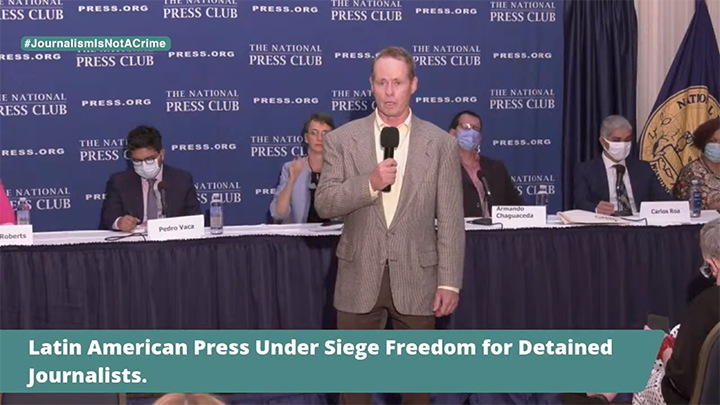Journalists detail persecution of Latin American reporters
Journalism is not a crime.
That theme echoed through a panel discussion Tuesday at the National Press Club as Latin American journalists called attention to government repression of reporting in their countries.
In the past 20 months, at least 27 journalists have been killed in Latin America, said panel moderator Dagmar Thiel, chief executive of Fundamedios, an organization that promotes free expression and human rights.
Many more have been threatened, attacked or jailed for reporting not in line with their governments' policies.

Univision correspondent Tifani Roberts said every journalist not aligned with the Nicaraguan government has been investigated and their families harassed, even having their children followed to school. Every one of them has an exit plan for when -- "not if" -- they must leave the country for their safety.
Nicaragua President Daniel Ortega has 20,000 men and women "dedicated to selective persecution" of voices of dissent, said Anibal Toruno of Radio Dario. This month, Nicaragua's last remaining newspaper, La Prensa, was raided and executives taken into custody.
The governments of Nicaragua, Venezuela and Cuba harass journalists with techniques from the same playbook, said Carlos Roa of the Association of Venezuelan Journalists Abroad. Thirteen of his fellow Venezuelan journalists are in prison or on probation, and one of them, Roland Carreno, is being denied urgent medical care.
Such treatment can have the desired effect of intimidating the press, Roberts said. "They're all practicing self-censorship. They have to be careful what they say."
In Venezuela, intimidated journalists may "cease professional activities for a period of time," leaving the citizenry ill-informed about the government's actions, said Luz Mely Reyes, co-founder of digital media franchise Efecto Cocuyo.
Reporters' movements are tracked. When Roberts returned to Nicaragua, 20 armed officers were stationed outside her family's home. Still, in advance of Tuesday's Club discussion, her mother texted encouragement:
"Now you 2 tell America how important it is to help out all the journalist in Nicaragua as well as the rest of persecuted journalist throughout the world. You're the only ones that ring out the truths be known, as in Afgjanistan, how else would have we all known the truth is it wasn't for the reports from the ones inside the scenes? OK? Go!"
